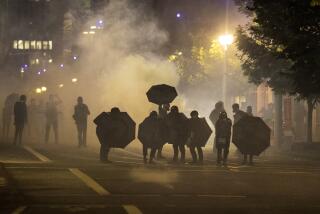U.S. investigating possible ISIS mustard gas use against Kurds
- Share via
Reporting from Washington — The U.S. is investigating whether Islamic State militants used a mustard gas agent against Kurdish peshmerga forces in at least two incidents, most recently this week in northern Iraq, officials said.
The allegations have yet to be confirmed by Kurdish authorities who are investigating whether the militants used chemical weapons in an attack about 30 miles from Irbil.
“We don’t know how they might have obtained the agent or how much they have, but it is obviously concerning,” said a U.S. official, who was not authorized to speak publicly on the matter. “This is all being looked at by the Kurds.”
Peshmerga fighters suffered breathing problems and skin injuries after militants fired munitions that delivered the agent. It is now being tested to determine whether it is mustard gas, officials said.
There are allegations that the agent was used in northern Syria last month.
Islamic State has been accused of using chlorine gas in attacks, but the possible use of mustard gas, which is a chemical substance banned from the battlefield since 1993, is deeply concerning to the Pentagon.
“At this point we really don’t know what if anything may have been used,” Col. Pat Ryder, spokesman for U.S. Central Command, which oversees the battle against the Islamist militant group, said Friday. “Any use of chemical and biological materials as a weapon is inconsistent with international standards and norms.”
If it is found to be mustard gas, the biggest question is how Islamic State got it.
Syrian President Bashar Assad was accused of using lethal chemical agents against civilians in 2013 during the civil war that has ravaged his nation for more than four years. More than 600 tons of Assad’s sarin and mustard agents were destroyed last year under a brokered deal.
It remains unclear whether any of Assad’s chemical weapons were obtained by the Islamic State.
More to Read
Sign up for Essential California
The most important California stories and recommendations in your inbox every morning.
You may occasionally receive promotional content from the Los Angeles Times.











